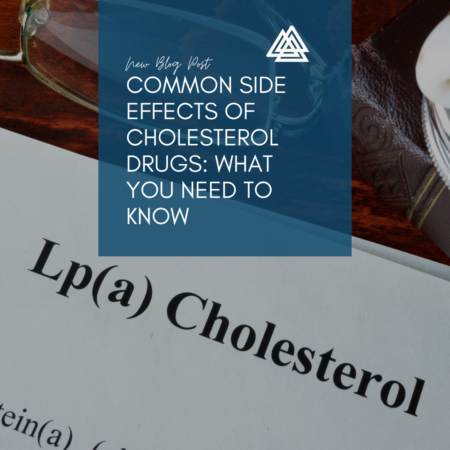 Cholesterol-lowering medications, often prescribed to help manage high cholesterol levels, play a crucial role in reducing the risk of heart disease, stroke, and other cardiovascular conditions. While these drugs can be highly effective, they may also come with side effects that can affect a patient’s quality of life. Understanding these side effects is essential for anyone taking cholesterol medications or considering them. In this blog post, we will explore the common side effects associated with cholesterol drugs and what patients can do to manage them.
Cholesterol-lowering medications, often prescribed to help manage high cholesterol levels, play a crucial role in reducing the risk of heart disease, stroke, and other cardiovascular conditions. While these drugs can be highly effective, they may also come with side effects that can affect a patient’s quality of life. Understanding these side effects is essential for anyone taking cholesterol medications or considering them. In this blog post, we will explore the common side effects associated with cholesterol drugs and what patients can do to manage them.
Types of Cholesterol-Lowering Medications
Before discussing side effects, it’s important to understand the different types of cholesterol-lowering medications available. The most commonly prescribed classes of these drugs include:
- Statins: These are the most widely used cholesterol-lowering medications. They work by blocking a substance your body needs to make cholesterol, thereby reducing LDL (low-density lipoprotein) cholesterol levels.
- Bile Acid Sequestrants: These drugs help remove cholesterol from the bloodstream by binding to bile acids in the intestine.
- Cholesterol Absorption Inhibitors: These medications work by preventing the absorption of cholesterol from the food you eat.
- PCSK9 Inhibitors: A newer class of medications that lower LDL cholesterol by enhancing the liver’s ability to remove cholesterol from the blood.
- Fibrates: Primarily used to lower triglycerides and, to some extent, increase HDL (high-density lipoprotein) cholesterol.
- Niacin: This vitamin can help lower LDL cholesterol and triglycerides while raising HDL cholesterol.
Common Side Effects
While many people tolerate cholesterol medications well, some may experience side effects. Here are some common side effects associated with these drugs:
- Muscle Pain and Weakness
- Statins: One of the most reported side effects of statins is muscle pain or weakness, often referred to as myalgia. In some cases, this can escalate to rhabdomyolysis, a rare but serious condition that leads to muscle breakdown and kidney damage.
- Digestive Issues
- Bile Acid Sequestrants and Cholesterol Absorption Inhibitors: These medications can cause digestive problems such as bloating, gas, constipation, and diarrhea. These side effects are often due to changes in bile acid flow or cholesterol absorption in the intestines.
- Liver Damage
- Statins: Elevated liver enzymes can occur in some individuals taking statins, indicating potential liver damage. Regular liver function tests are usually recommended for patients on these medications to monitor any changes.
- Increased Blood Sugar Levels
- Statins: There is evidence suggesting that statin use can lead to a slight increase in blood sugar levels, which may be a concern for individuals with diabetes or those at risk for developing diabetes.
- Skin Reactions
- Niacin: This vitamin can cause flushing, itching, and rashes in some individuals, particularly when taken at higher doses.
- Neurological Effects
- Statins: Some studies have raised concerns about cognitive issues, including memory loss or confusion, although these side effects are generally considered rare and reversible.
Managing Side Effects
If you experience side effects from cholesterol medications, it’s essential to communicate with your healthcare provider. Here are some tips for managing side effects:
- Stay Informed: Understand the potential side effects associated with your specific medication. Being aware can help you identify and report any issues promptly.
- Adjust Dosages: In some cases, adjusting the dosage or switching to a different medication may alleviate side effects. Your healthcare provider can help determine the best approach.
- Incorporate Lifestyle Changes: Dietary changes, regular exercise, and weight management can significantly impact cholesterol levels. These lifestyle modifications may also reduce the need for higher medication doses, potentially decreasing side effects.
- Regular Monitoring: Schedule regular follow-up appointments with your healthcare provider to monitor your cholesterol levels and assess any side effects. Blood tests can help track liver function, muscle enzyme levels, and blood sugar levels.
Conclusion
While cholesterol-lowering medications are essential for managing high cholesterol and reducing the risk of cardiovascular diseases, they can also come with side effects that affect patients’ daily lives. Understanding these side effects, communicating openly with healthcare providers, and adopting a proactive approach to managing them can help patients navigate their treatment journey more effectively. Remember that the benefits of cholesterol medications often outweigh the risks, but it’s crucial to stay informed and involved in your healthcare decisions. If you have concerns about your cholesterol medication or its side effects, don’t hesitate to reach out to your healthcare provider for personalized advice and support.
